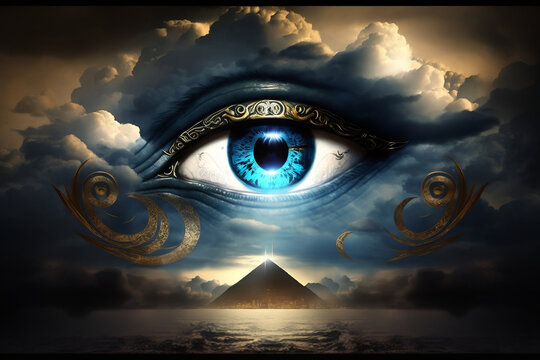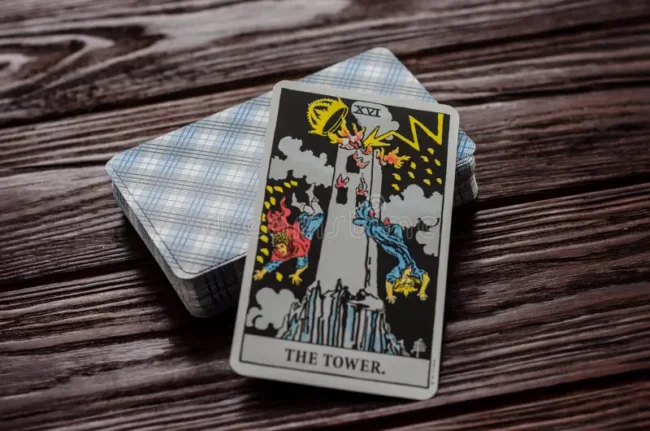Eye of Horus Spiritual Meaning: Symbol of Protection
Introduction
Ever wondered about the profound significance behind ancient symbols?
Among these, the Eye of Horus stands out as a captivating emblem, steeped in history and spiritual meaning.
This symbol, originating from ancient Egypt, has transcended time, continuing to fascinate and intrigue people worldwide.
Let’s delve into its enigmatic world and uncover the layers of symbolism and spirituality it holds.
Short Answer
The Eye of Horus, a symbol from ancient Egyptian mythology, represents protection, healing, and restoration.
Often depicted as a stylized eye, it conveys a sense of watchfulness and divine providence.
Over the ages, this symbol has evolved, embodying various spiritual and metaphysical interpretations, making it a subject of enduring fascination and reverence in modern times.
Symbol of Protection
In ancient Egyptian culture, the Eye of Horus was a powerful protective amulet. It was believed to ward off evil spirits and bring safety to the wearer.
This belief stemmed from the myth where Horus, the sky god, battles with Set, resulting in the loss and subsequent restoration of his eye.
Thus, wearing this symbol was thought to imbue one with the protective powers of the gods, a concept that resonates even in contemporary spirituality.
Healing and Restoration
Apart from protection, the Eye of Horus is deeply associated with healing and restoration.
The myth of Horus and his restored eye symbolizes overcoming adversity and healing from physical and emotional wounds.
This aspect of the symbol encourages resilience and recovery, offering a beacon of hope to those seeking solace and strength in difficult times.
Balance and Harmony
The Eye of Horus also symbolizes balance and harmony. In ancient Egyptian art, it often appears alongside the concept of Ma’at, the goddess of truth, balance, and order.
This association suggests that the Eye of Horus is not just a protective talisman but also a reminder to maintain balance in life, advocating for a harmonious existence in tune with the universe’s natural order.
Divine Providence and Wisdom
Another layer of its spiritual meaning is its representation of divine providence and wisdom.
The eye, often associated with the sun god Ra, signifies the watchful gaze of the divine.
It’s a symbol that speaks to the belief in a higher power overseeing and guiding the human journey, offering wisdom and insight.
The Journey of the Soul
In the realm of spirituality, the Eye of Horus is sometimes seen as a symbol of the soul’s journey. It represents spiritual awakening, enlightenment, and the quest for deeper understanding.
This aspect of the symbol invites introspection and self-discovery, encouraging individuals to explore the depths of their spiritual path.
Connection to the Natural World
The Eye of Horus also has connections to the natural world, particularly the cycles of the moon and sun.
It reflects the interplay between light and darkness, day and night, embodying the natural rhythms and cycles of the universe.
This symbolism emphasizes the importance of living in harmony with nature and understanding our place within the cosmic order.
Symbol of Royalty and Authority
Historically, the Eye of Horus was also a symbol of royalty and authority in ancient Egypt.
Pharaohs and nobility often used the symbol to assert their divine right to rule and their connection to the gods.
This aspect highlights the symbol’s association with power, leadership, and the divine mandate to govern.
Gateway to the Mystical
For many, the Eye of Horus is a gateway to the mystical and esoteric. It’s seen as a key to unlocking hidden knowledge and understanding the mysteries of the universe.
This aspect appeals to those drawn to the occult and the exploration of the unknown, seeking deeper truths beyond the material world.
Manifestation of Duality
The Eye of Horus embodies the concept of duality – the coexistence of opposing forces. It symbolizes the balance between light and dark, good and evil, physical and spiritual realms.
This duality reflects the ancient Egyptians’ understanding of the world as a place where these forces are constantly interacting, reminding us of the need to acknowledge and balance these elements in our lives.
Emblem of Intuition and Inner Vision
Delving deeper, the Eye of Horus is also an emblem of intuition and inner vision. It represents the ability to see beyond the obvious, to understand the deeper meanings and truths that lie beneath the surface.
This symbol encourages us to trust our instincts and tap into our inner wisdom, guiding us through the journey of life.
Symbol of Resurrection and Eternal Life
In the context of Egyptian mythology, the Eye of Horus is often associated with resurrection and eternal life.
This ties back to the story of Osiris, Horus’s father, who was resurrected after his murder. The eye, in this sense, symbolizes the hope of life after death and the eternal journey of the soul.
Related Questions
How Does the Eye of Horus Connect to Modern Spirituality?
In modern spirituality, the Eye of Horus has found a place as a symbol of awareness and enlightenment.
It’s often used in meditation and mindfulness practices as a focus for concentration and a reminder of the spiritual journey.
What is the Difference Between the Eye of Horus and the Eye of Ra?
While often confused, the Eye of Horus and the Eye of Ra are distinct symbols in Egyptian mythology.
The Eye of Ra is associated with the sun god and symbolizes his power and wrath, whereas the Eye of Horus is more connected to healing, protection, and resurrection.
Can the Eye of Horus Be Used in Healing Practices?
Yes, the Eye of Horus is sometimes used in healing practices. It’s believed to carry energies of protection and restoration, making it a popular symbol in various healing and therapeutic modalities.
What Role Does the Eye of Horus Play in Occult Practices?
In occult practices, the Eye of Horus is often used as a symbol of protection against negative energies and as a tool for accessing hidden knowledge and mystical powers.
Is the Eye of Horus Connected to Any Astrological Significance?
Yes, the Eye of Horus is sometimes linked to astrological interpretations. Its connection to the sun and moon, and its representation of light and darkness, tie it to celestial movements and astrological beliefs.
Scenarios Related to Eye of Horus
| Scenario | Description |
| Meditation | Using the Eye of Horus as a focus point during meditation for spiritual awakening |
| Healing Session | Incorporating the symbol in healing practices for its restorative energy |
| Personal Amulet | Wearing an Eye of Horus amulet for protection and guidance |
| Artistic Inspiration | Drawing inspiration from the symbol in creative and artistic endeavors |
| Historical Study | Exploring the Eye of Horus in the context of Egyptian history and mythology |
| Spiritual Ritual | Utilizing the symbol in spiritual rituals and ceremonies |
| Educational Tool | Teaching about ancient symbols and their meanings using the Eye of Horus |
| Cultural Exploration | Delving into different cultural interpretations of the Eye of Horus |
These scenarios showcase the diverse ways in which the Eye of Horus permeates various aspects of life, from personal spirituality to educational and cultural exploration.
Detailed Descriptions of Scenarios
Meditation Using the Eye of Horus
Meditating with the Eye of Horus as a focal point can be a profound experience. It allows individuals to tap into the symbol’s deep spiritual meanings, fostering a sense of connection with ancient wisdom and inner peace.
This practice can enhance intuition and bring clarity to the mind.
Healing Session Incorporation
Incorporating the Eye of Horus in healing sessions, whether it’s through imagery or physical amulets, can add a layer of spiritual significance.
It’s believed to aid in the healing process, offering protective energy and a sense of comfort to those undergoing physical or emotional recovery.
Personal Amulet for Protection and Guidance
Wearing an Eye of Horus amulet serves as a personal shield against negative energies. It’s also seen as a guiding symbol, helping individuals to make decisions aligned with their highest good, and serving as a reminder of their spiritual journey.
Artistic Inspiration from the Eye of Horus
Artists often draw inspiration from the Eye of Horus, using its intricate design and rich symbolism to create works that explore themes of protection, enlightenment, and the mystical. It serves as a bridge between the ancient and the modern, infusing art with a sense of timelessness and deeper meaning.
Historical Study of the Symbol
Studying the Eye of Horus in a historical context allows for a deeper understanding of its origins and evolution.
It provides insights into ancient Egyptian culture, beliefs, and practices, making it a valuable tool for educators and historians alike.
Spiritual Rituals Featuring the Eye of Horus
Incorporating the Eye of Horus in spiritual rituals can enhance the ceremony’s significance. It’s used in rituals related to protection, healing, and spiritual awakening, symbolizing the connection to ancient wisdom and the divine.
Educational Tool for Ancient Symbols
The Eye of Horus serves as an excellent educational tool, providing an entry point into the study of ancient symbols and their meanings.
It offers a glimpse into the rich tapestry of symbolism that has influenced cultures and beliefs throughout history.
Cultural Exploration through the Eye of Horus
Exploring the Eye of Horus allows for a broader understanding of how different cultures interpret and adopt ancient symbols.
It highlights the symbol’s universal appeal and its ability to transcend cultural boundaries, enriching our understanding of global spirituality and symbolism.
Additional Symbols Related to the Eye of Horus
Symbol of the Ankh
- Represents life and eternal life.
- Often paired with the Eye of Horus to symbolize the journey of the soul.
- Seen as a key to unlocking the mysteries of existence.
The Scarab Beetle
- Symbolizes rebirth and regeneration.
- Connected to the sun’s journey across the sky.
- Represents transformation and new beginnings.
The Djed Pillar
- Stands for stability and enduring strength.
- Often associated with Osiris, the god of the afterlife.
- Represents resilience and the backbone of life.
The Feather of Ma’at
- Embodies truth, justice, and cosmic order.
- Used in the weighing of the heart ceremony in the afterlife.
- Symbolizes living a life of balance and harmony.
The Lotus Flower
- Represents purity, enlightenment, and rebirth.
- Emerges from murky waters, symbolizing triumph over adversity.
- Associated with spiritual awakening and the unfolding of spiritual potential.
Conclusion
The Eye of Horus is not just a relic of ancient Egypt but a living symbol that continues to resonate with profound spiritual meanings.
It represents protection, healing, balance, and insight into the mystical realms. Whether used in meditation, as an amulet, or in art and education, the Eye of Horus offers a timeless connection to ancient wisdom and spirituality.
As we explore its depths, we uncover layers of meaning that enrich our understanding of the past and guide us on our present spiritual journey.







